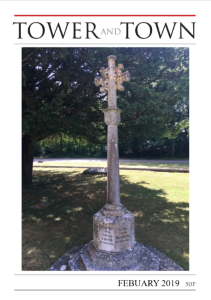

Tower and Town, February 2019 (view the full edition) (view the full edition)What Is Prayer ForFaith Leaders And Thinkers Discuss Last autumn the College hosted a discussion in the newly refurbished Memorial Hall in which four faith leaders and thinkers presented their thoughts on Prayer and answered questions. Your Editor recalls some of the points that struck him. The Bishop of Salisbury, the Rt Rev Nicholas Holtam, began by saying that we all pray instinctively, but that we can be taught to pray, as the disciples request to Jesus shows - the request that produced 'The Lord's Prayer.' The purpose of prayer is to 'place ourselves in the presence of God', not to be granted 'things', but to change ourselves and to strengthen the qualities that we need as members of the community. Munawar Hussain, a Muslim Imam, told us that according to The Koran creation is in a state of perpetual prayer with God and that when Muslims pray they tune into the rest of creation. After ritual ablution, a washing away of sin and material distractions, prayer brings you near to God, to worship God as if you see him, to have an intimate conversation with him. This concentration brings emotional release and mental peace. Communal prayer and its movements are important as a social leveller. Madeleine Bunting, a journalist, spoke about the practice and benefits of 'mindfulness', a word she preferred to 'prayer'. Our minds are continuously exposed to stimulation and the 'busy-ness' of things around us, and we need 'to turn the sound down', to meditate, 'to settle the mind'. With this 'habit of the heart' we can cultivate an openness, a 'loving awareness', to forgo the drive to 'judge' and to 'achieve'. Dr Tony Stoller, brought up a Jew and now a Quaker, pointed out that, whatever one's religious allegiance, whatever liturgical differences there are between faiths, personal prayer is much the same; Jews and Quakers both believe that in prayer we encounter the divine. He quoted Rabbi Lionel Blue: "Prayer does not change the external world; it has changed me." The purpose of prayer is not to prompt God to action, but to give us the resolve and strength to fulfil the obligations that are on us. What happens in intercessionary prayer, then? This was explored in discussion afterwards. Two replies from the panel shone out: "(Prayer) holds people to the light'" and "(Prayer) is the economy of love: someone puts something in and someone else draws out." John Osborne |